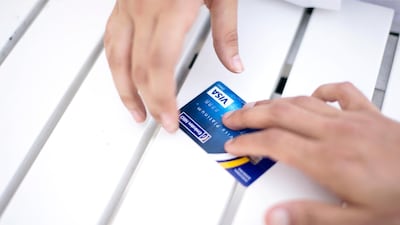When I was about 20, I worked at a store called Sears selling televisions. One day, a refurbished floor model was available for purchase. It cost about $1,000 less than normal, and was in perfect condition. I knew I wanted it. While I had the money, the store offered a further discount if I put the purchase on a store credit card, which seemed like a great idea! I could have the TV, but not have to part with a lot of money – all the positives and none of the negatives. Or so I thought.
Then the first bill came. I’ve always liked maths, but was still new to credit cards and hadn’t experienced interest in all of its money-draining glory. And the number seemed off. I multiplied it by the monthly payments (it was a 12-month plan) and suddenly my $500 TV would end up costing me over $600!
I was outraged. I had only agreed to a $500 product, why should I pay an extra $100? Fortunately, my dad was able to talk to me about it and told me that if I paid it off early, I wouldn’t have to pay that extra interest payment of $100, and the faster I paid it off, the less interest I would have to pay. I immediately did the hard work of paying off the entire balance of the TV and cutting up the credit card so I wouldn’t be further tempted.
That lesson cemented two things in my mind that have guided my actions ever since: the first is that I hate paying interest. It seems quite unfair that I should have to pay extra for an already expensive thing. This led me to the second thing, a hatred of credit cards and loans, and a desire to either never get them or to pay them off so fast that I don’t have to pay extra interest.
So much of the consumerist lifestyle in the West is oriented around spending more than you earn by using credit cards, then making the minimum monthly payment as your balance steadily increases. It’s an entirely too convenient way to live beyond our means. The problem with this is that by only making the minimum payments, the amount you owe keeps going up due to the exorbitant rates of interest, sometimes as high as 45 per cent per year.
This creates an infinite deficit of money that is almost impossible to pay off after a few years. But by hating paying extra and by paying off any debts as fast as possible, before the avalanche of debt really got going, I was able to dodge this lifestyle trap.
For the next 15 years after the TV incident, I didn’t use a credit card or take out loans except for two cases. The first was buying a car and the second was a student loan to get my masters’ degree. For the car, I intentionally bought a reliable but not flashy used car that I could easily afford the payments of, or pay off the balance entirely if I chose. I chose instead to invest the money and get a return on it much higher than the interest I was paying on the car loan, which was about 3 per cent.
For the student loan, I tutored after work, started a photography business and made money playing music for three years to pay off the loan in a fraction of the time that it usually takes people to deal with a debt of that size. I let my hatred of interest and paying extra fuel my desire to give up time to make extra money to throw at the debt and get rid of it.
So many friends and relatives of mine don’t feel that anger about interest and get used to making the monthly payments. This mountain of debt keeps adding more and more financial pressure. This is a key reason that plenty of people with decent paying jobs still can’t find enough money to pay off a surprise $400 bill in the US. It’s no different in the UAE, except it’s even more dangerous, because if you have debts in the UAE, they can keep you from leaving the country legally.
One final tip to help avoid the trap of the ever-mounting monthly payments is to rent luxury. It may seem like a great idea to have a big pick-up truck to help people move or an extra bedroom in your house for guests who come once a year, or a boat to enjoy the wonderful waters of the UAE, but this thinking is financially dangerous. It’s a lot cheaper to rent a truck when someone needs to move, to get a hotel room for guests who come and to rent a boat to take out with friends than to buy an expensive luxury that you end up paying thousands of dirhams more for. This way, you can still have fun and luxurious experiences, but at a fraction of the cost, and you don’t have to worry about maintenance, insurance or interest on monthly payments.
Your money is yours. You worked hard for it, you earned it and you need it. Get angry when someone tries to take it from you. You wouldn’t just let someone rob you on the street. Why let a bank do it with a credit card?
Schoolteacher Zach Holz (@HappiestTeach) documents his journey towards financial independence on his personal finance blog The Happiest Teacher

